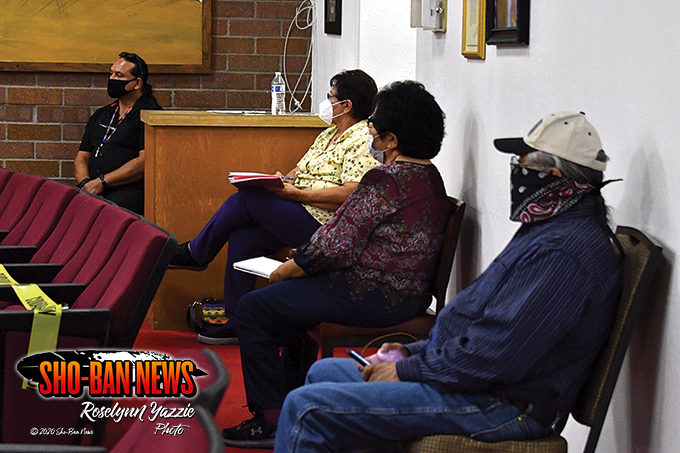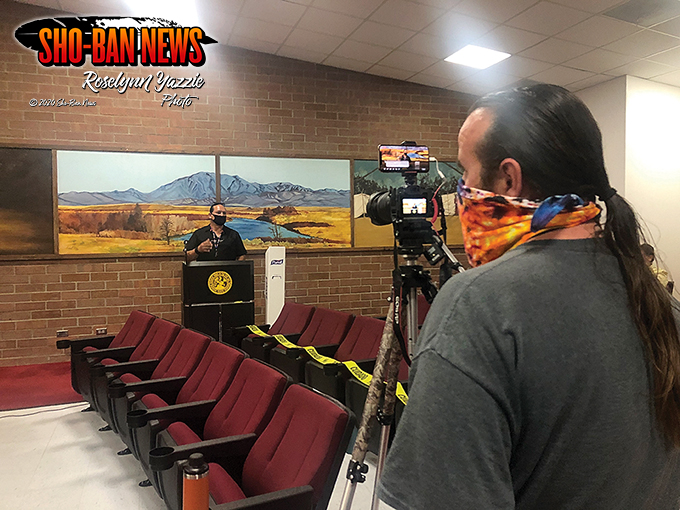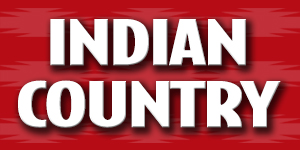Candidates campaign at Virtual Forum

Candidates for Fort Hall Business Council socially distance and wear masks as they wait for the event to begin.
By ROSELYNN YAZZIE
Sho-Ban News
FORT HALL — For the first time ever the Shoshone-Bannock Tribes had a Virtual Candidate Forum, which was streamed live on the Tribe’s Facebook page on Wednesday, August 19.
Daniel Stone was invited to moderate the event. He is a Policy Analyst for the Tribe’s Fish & Wildlife Department.
All candidates were invited to participate in the forum, but not all were in attendance. Candidates present were Devon Boyer, Marlene Skunkcap, Darrell Shay and Elma Thompson.
Stone said the intent of the candidate forum was to provide each of the candidates an opportunity to educate the tribal electorate on their unique perspective, as well as to provide an open session for the candidates to respond to the questions of tribal members from Facebook.
Due to the COVID-19 pandemic, organizers and candidates socially distanced themselves during the event and safety measures were taken.
“Our commitment to public health and safety is why this event is being done virtually,” he said.
Shoshone-Bannock tribal members were encouraged to register to vote. The General Election is on Friday, August 28 at the districts.
The following is a question answered from each candidate. Watch the entire forum on the Tribe’s Facebook page at https://www.facebook.com/watch/?v=936730456795402&extid=a6haIzRK0WFKOBFa, this is also where candidate introduction videos can also be viewed.

Mike Stone records candidates at the Virtual Forum on August 19. Devon Boyer speaks.
The first question had to do with COVID-19’s effect on not being able to gather in large groups due to safety measures and if the recommendation infringed upon the freedom of worship?
Devon Boyer’s response explained when he was younger every three or four houses had a sweatlodge and people purified themselves. Now, just like then those things need to still be done. He explained a sundance is a community ceremony, but a sweatlodge is an individual ceremony. He said everyone on the reservation has the ability and the knowledge to protect themselves, families, friends and relatives. He guarantees miracles happen in the sweatlodge and if one wants to help themselves and their families and do something proactive in a good way, a good manner of prayer, he encouraged them to build a sweatlodge and bring back the old ways. He acknowledged the natural elements, which are used for protection.
“Use those things that are good for you and purify you,” he said.
Candidates were asked about social media and if tribal leaders should have their own social media policies and guidelines for how council members engage on social media.
Elma Thompson responded by explaining the entire campaign process was different because they had to rely upon social media to get the word out and share things. She believes the tribal council should have some sort of policy to follow.
“We should be leading by example, if we’re on the council,” she said. “We should be having the ethics, we should be following the policies as well.”
Thompson said if she was elected she would promote a good policy for the tribal council to follow and mirroring it to what us already in place for tribal employees.
Marlene Skunkcap was asked about working with other tribal council members and how she would gain their support for actions she wants to see in the community. Skunckap talked of her experience serving two terms on the Fort Hall Business Council and she knows the importance of working together with the other council.
“There’s no way that we can come to any decisions if we’re not working together or communicating,” she said. Adding it sounds really simple, but sometimes it cannot be. She said she would like to work with all the council and is willing to talk and communicate concerns.
Darrell Shay was asked about state relations and past fractured and sometimes turbulent relationship with the state of Idaho, as an elected tribal official should the tribes engage with the states public health districts, why or why not? How do we strengthen the tribes relationship with the state when we address public health issues?
Shay responded he’s served on the council in a couple of different eras, in the mid 80s and at that time there was no relationship with the state. They believed they were a sovereign nation and they exercised that. Over the course of time he was on the council again in ’97 and ’99, he said things change a little bit and they had to become more involved with the state. He soon saw tribal health departments apply for state grant funding, before you know it he said the councils didn’t realize it was eroding the sovereignty by entering into contracts with the state of Idaho. He explained the state is on the hierarchy of things and are below.
“The federal government is above us because of the treaty relationship,” he explained.
Shay said now with the COVID-19 pandemic the tribes have to depend on the state government to address the health issues.
“I, personally believe that we should have been prepared for it. We should have exercised our sovereignty and said, ‘Let’s save money,’ because basically that’s what we’re doing,” said Shay.
He mentioned there was a comp plan that addressed it.





